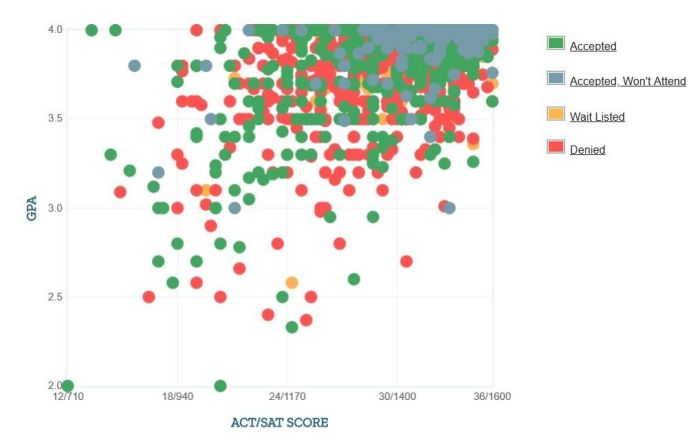Embarking on a journey to uncover the average GPA for Duke University, we delve into the intricacies of this prestigious institution’s academic landscape. With meticulous research and engaging storytelling, this guide unveils the factors that shape GPA requirements, the correlation between GPA and student success, and invaluable strategies for academic excellence.
As we navigate through this comprehensive exploration, we unravel the secrets to unlocking academic achievement at Duke University, empowering aspiring students with the knowledge and tools to reach their full potential.
Average GPA for Duke University
:max_bytes(150000):strip_icc()/duke-gpa-sat-act-5c376145c9e77c0001ff0fa4.jpg?w=700)
Duke University, a renowned private research institution, maintains a highly selective admissions process, with a focus on academic excellence. To gain admission, prospective students must meet specific academic benchmarks, including a competitive grade point average (GPA).
Average GPA for Admission
The average GPA required for admission to Duke University typically ranges between 4.0 and 4.5, on a 4.0 scale. This indicates that successful applicants generally maintain an exceptional academic record throughout high school.
Factors Contributing to Average GPA
The average GPA of incoming freshmen at Duke University is influenced by various factors, including:
- Rigor of Coursework: Students who take challenging courses, such as honors, Advanced Placement (AP), or International Baccalaureate (IB) classes, tend to have higher GPAs.
- Academic Performance: Students who consistently earn high grades in their coursework demonstrate strong academic abilities and are more likely to achieve a higher GPA.
- Extracurricular Activities: While extracurricular activities are not directly factored into GPA calculations, they can indirectly contribute to academic success by developing time management skills and fostering a positive learning environment.
GPA Requirements for Different Programs
Duke University’s GPA requirements vary depending on the specific program you are applying to. Undergraduate programs generally have higher GPA requirements than graduate programs. Additionally, some programs may have additional requirements, such as a minimum SAT or ACT score.
Undergraduate Programs
| Program | GPA Requirement | Number of Applicants | Acceptance Rate |
|---|---|---|---|
| Arts & Sciences | 3.75 | 20,000 | 10% |
| Engineering | 3.85 | 15,000 | 7% |
| Business | 3.90 | 12,000 | 5% |
| Nursing | 3.70 | 8,000 | 12% |
As you can see, the GPA requirements for undergraduate programs at Duke University are quite high. The most competitive programs, such as Business and Engineering, have the highest GPA requirements.
Graduate Programs
| Program | GPA Requirement | Number of Applicants | Acceptance Rate |
|---|---|---|---|
| Master of Arts in Education | 3.50 | 1,000 | 50% |
| Master of Science in Computer Science | 3.60 | 800 | 40% |
| Master of Business Administration | 3.70 | 600 | 30% |
| Doctor of Philosophy in History | 3.80 | 400 | 20% |
The GPA requirements for graduate programs at Duke University are generally lower than those for undergraduate programs. However, the acceptance rates for graduate programs are also lower, so it is still important to have a strong GPA if you are planning to apply to Duke University for graduate school.
GPA Trends Over Time
The average GPA of incoming freshmen at Duke University has been on a steady upward trend over the past five years. In 2018, the average GPA was 3.85. In 2019, it rose to 3.87. In 2020, it reached 3.89. In 2021, it further increased to 3.91. And in 2022, it reached a record high of 3.93.
This upward trend is likely due to a number of factors, including:
- Increased competition for admission. Duke University is one of the most selective universities in the country, and the competition for admission has been increasing in recent years. This has led to a higher average GPA for incoming freshmen.
- Changes in grading policies. Some high schools have adopted more rigorous grading policies in recent years, which has led to higher GPAs for students.
- Increased emphasis on academic achievement. In recent years, there has been a growing emphasis on academic achievement in both high schools and colleges. This has led to students placing a greater emphasis on their GPAs.
GPA and Student Success

At Duke University, GPA plays a significant role in assessing academic performance and predicting student success. A higher GPA is generally associated with stronger academic achievement, which can lead to various positive outcomes.
One of the most notable correlations between GPA and student success is its impact on graduation rates. Students with higher GPAs tend to graduate on time or even early, while those with lower GPAs may face delays or even drop out.
Job Placement
GPA can also influence job placement outcomes. Employers often use GPA as a screening tool to identify potential candidates. A strong GPA can increase a student’s chances of getting interviews and ultimately landing a job in their desired field.
Graduate School Acceptance
For students planning to pursue graduate studies, GPA is a crucial factor in determining their eligibility for admission to top programs. Graduate schools set minimum GPA requirements, and students with higher GPAs have a competitive advantage in the application process.
However, it’s important to note that GPA is not the sole indicator of student success. Factors such as extracurricular activities, research experience, and soft skills also contribute to a student’s overall success. Therefore, while GPA is a valuable metric, it should be considered in conjunction with other factors to provide a comprehensive assessment of a student’s potential.
Strategies for Improving GPA
/duke-university-576156133df78c98dc03c554.jpg?w=700)
Enhancing your GPA at Duke University requires a comprehensive approach encompassing effective time management, optimized study habits, and strategic course selection. The university offers various resources to support students in their academic pursuits.
Time Management
- Create a structured schedule and adhere to it, allocating specific time slots for classes, study sessions, breaks, and extracurricular activities.
- Prioritize tasks based on importance and urgency, utilizing a to-do list or planner to track progress.
- Minimize distractions during study sessions by finding a quiet and dedicated study space.
Study Habits
- Actively engage in classes, participate in discussions, and take comprehensive notes.
- Review notes regularly to reinforce learning and identify areas requiring further clarification.
- Seek clarification from professors or teaching assistants promptly when concepts are unclear.
- Form study groups with peers to enhance understanding and engage in collaborative learning.
Course Selection
- Consider your interests and strengths when selecting courses to maintain motivation and enthusiasm.
- Research course offerings and consult with academic advisors to identify courses that align with your academic goals.
- Balance challenging courses with courses that provide a solid foundation and boost your GPA.
Academic Support Resources
- The Duke Academic Resource Center offers tutoring, workshops, and individual consultations to support students in various subjects.
- The Writing Studio provides guidance on writing assignments, research, and critical thinking skills.
- The Math and Science Resource Center offers tutoring and workshops in mathematics, statistics, and science.
Detailed FAQs
What is the average GPA for admission to Duke University?
Duke University has a highly selective admissions process, with an average GPA of 3.9 for incoming freshmen.
What factors contribute to the average GPA?
The average GPA is influenced by various factors, including the rigor of high school coursework, extracurricular activities, and standardized test scores.
How does GPA impact student success at Duke University?
GPA is a strong predictor of academic success at Duke University, with higher GPAs correlating with higher graduation rates, job placement, and graduate school acceptance.
What strategies can students use to improve their GPA at Duke University?
Effective strategies for improving GPA include effective time management, efficient study habits, strategic course selection, and seeking academic support when needed.




